Wolfram|Alpha: This Could Be the Start of Something Big
By Harry McCracken | Saturday, May 16, 2009 at 10:49 am
![]() Back in March, Radar Networks CEO Nova Spivack blogged about Wolfram|Alpha, a new Web service from Mathematica creator Stephen Wolfram, and said it could be as important as Google. Nova’s a smart guy, but it was reasonable to greet his enthusiasm with skepticism–new stuff gets favorably compared to Google all the time, and often turns out to be massively disappointing. But Wolfram|Alpha is now live–albeit in a preview mode that’s struggling to keep up with the sudden influx of users–and Nova’s assessment turned out to be cool and collected. The service is a work in progress, but it’s the most interesting new research tool since Wikipedia–and yes, it’s not unreasonable to discuss it in the same breath as Google.
Back in March, Radar Networks CEO Nova Spivack blogged about Wolfram|Alpha, a new Web service from Mathematica creator Stephen Wolfram, and said it could be as important as Google. Nova’s a smart guy, but it was reasonable to greet his enthusiasm with skepticism–new stuff gets favorably compared to Google all the time, and often turns out to be massively disappointing. But Wolfram|Alpha is now live–albeit in a preview mode that’s struggling to keep up with the sudden influx of users–and Nova’s assessment turned out to be cool and collected. The service is a work in progress, but it’s the most interesting new research tool since Wikipedia–and yes, it’s not unreasonable to discuss it in the same breath as Google.
It is, however, a little more complicated to explain. Wolfram|Alpha’s tagline is “Computational Knowledge Engine,” which reflects the fact that it consists of a gigantic database of facts–math and scientific matters are a specialty, but it also knows about world history, geography, movies, music, stock prices, and a lot more–and has a semantic understanding of the information therein. Which means that when you search for something on Wolfram|Alpha, it responds not by providing Google-like links to other sites, but by attempting to understand the meaning of your query and assembling an answer from its own repository of knowledge.
It’s far easier to explain all this with examples. Like these ones:

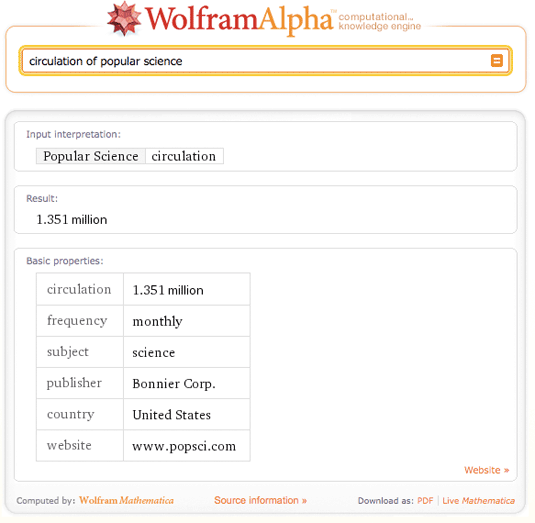
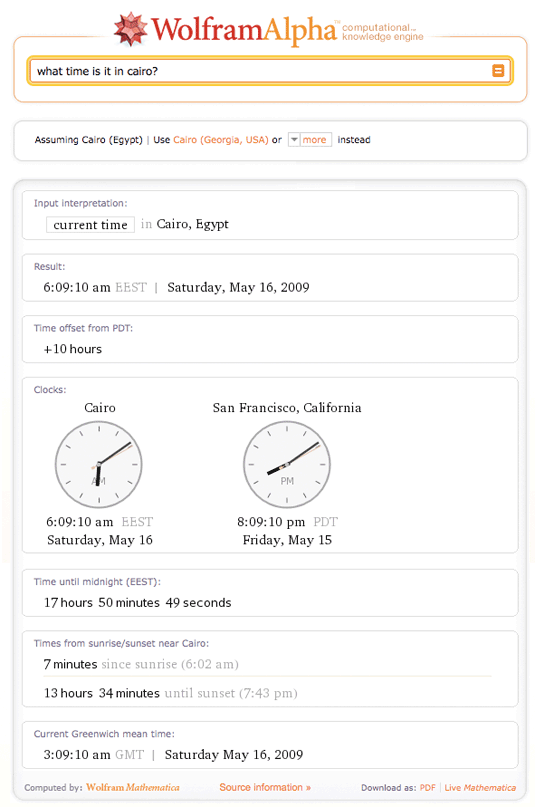
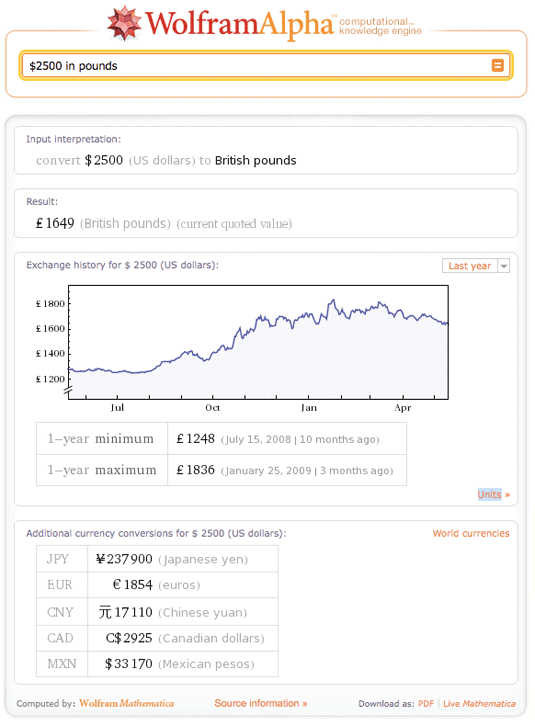


The less specific your query, the more likely Wolfram|Alpha is to give you a surging sea of relevant information, including things you never knew that anyone knew, which it’s computed for you:
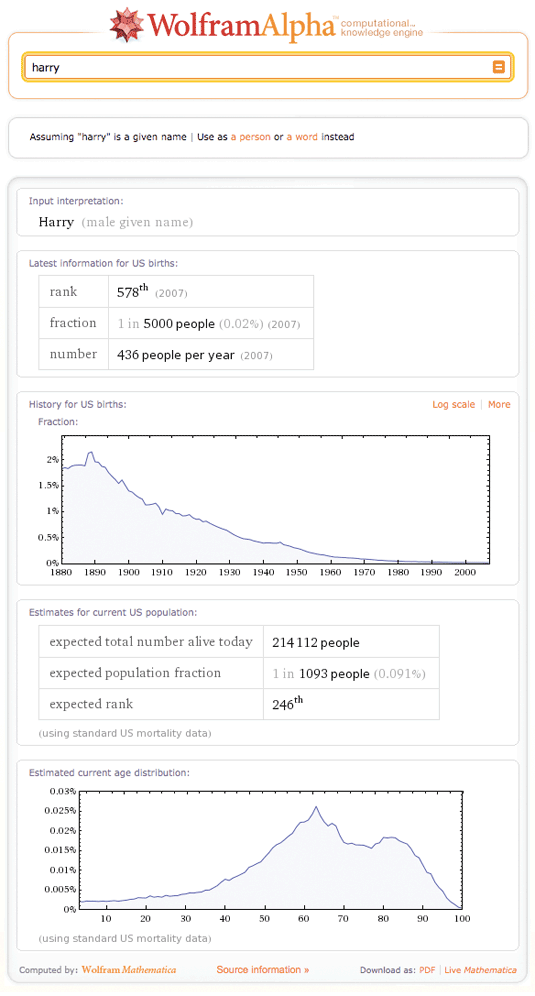
Over at Wolfram|Alpha, there are scads more example queries on topics of all sorts. The notion of a Web research tool delivering results rather than links to other sites isn’t new–I remember a promising, ill-fated startup called FactCity that tried to do just that–but nobody’s ever come close to what Wolfram has pulled off here.
Unlike most Web debutantes, this one is emerging with its own extremely distinctive personality. It’s wildly ambitious, nerdy, and a tad self-congratulatory. (Offhand, I can’t think of another major Web entrepreneur other than Wolfram who chose to name his brainchild after himself–I think I’ll just call it “Alpha” from here on out.) In the words of John Hodgman, it often provides more information than you require–in the above query about LBJ’s death, I can’t quite tell if the fact that it provides the current population of Johnson City means that it’s showing off, or that it’s not quite smart enough at this point to know that you probably don’t care.
Alpha is also elegant (the presentation of results sport some of the nicest Web typography and infographics I’ve ever seen). Most of all, it’s both astoundingly useful and fun to use.
It’s not, however, perfect. Google circa 2009 will give you something on any imaginable query. But Alpha’s knowledge base, though apparently vast, isn’t all encompassing. It often failed to understand my queries, though it sometimes understood them well enough to tell me that relevant information would be added in the future:
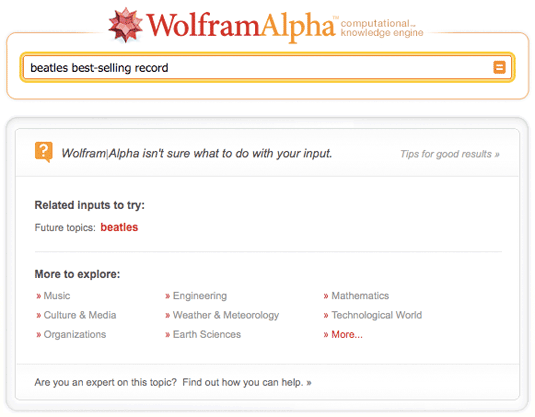
And sometimes even when it knows something, it can’t extract that information in ways you might expect it could. For instance, it knows the cast of Raiders of the Lost Ark, but this query failed:
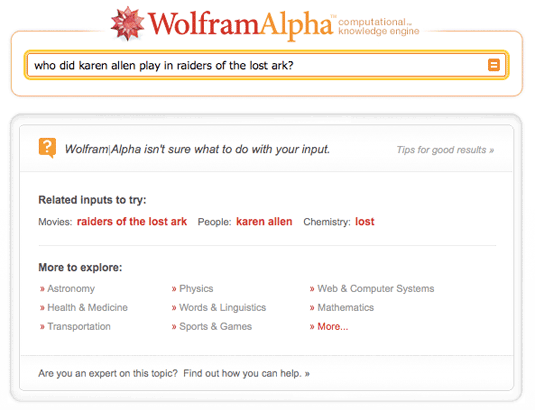
Some people are more bothered than I am by the fact that Alpha’s knowledge of the world is not yet exhaustive. I’m more frustrated by the fact that not all of the tidbits it knows are hitched up to related pieces of information. Search for a movie, and it’ll tell you the cast, but search for an actor or actress, and it doesn’t tell you what he or she has been in:
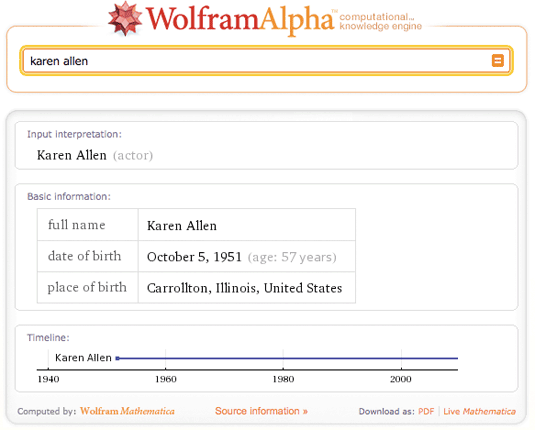
Alpha also doesn’t make much use of hyperlinking; it would be even cooler if, for instance, the reference to Carrollton, Illinois in the above results could take you to more information about it.
How reliable are Alpha’s facts? Unlike Google, it’ll never send you to a site that’s schlocky and inaccurate, and unlike Wikipedia, it’s not dependent on volunteers getting things right. The “Source information” links at the bottom of results give you some general information on where it gets its data, most of which comes from standard reference works. By Web standards, it should be pretty darn trustworthy, and it’s all factual. (It’s pointless to ask Alpha questions which involve matters of opinion.) I only ran across one area where I’d quibble with Alpha’s sources–when you search for a domain name–such as Technologizer.com–it quotes traffic stats from Alexa. And for every site I’ve ever had personal involvement in, Alexa’s numbers are useless gibberish.
I don’t mean to suggest that Alpha is in any way a disappointment–at least once it stops responding to some queries with this Failwhale-like error message:
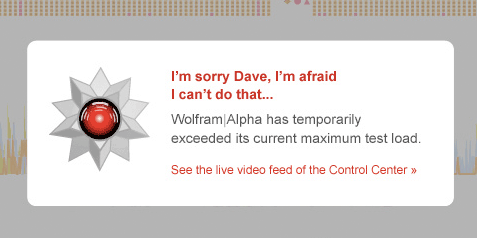
Actually, for a service that’s just a few hours old, it feels surprisingly mature. (It’s sure more evolved and polished than Google was when it first started to get good buzz a decade ago.) Along with Google and Wikipedia, it’s going to be one of my daily research tools from now on. And I can’t wait to see where it goes. Stephen Wolfram’s Wolfram Research has been working on Mathematica for more than two decades, so it’s not unreasonable to think that Alpha could go places that this first version just hints at.
11 Comments
Read more:
7 Comments For This Post
4 Trackbacks For This Post
-
Kryptoblog » Blog Archive » WolframAlpha - en beräkningsbaserad kunskapsmotor Says:
May 16th, 2009 at 12:46 pm[…] Kort sagt ett mycket spännande projekt som pekar framåt, men kanske inte helt färdigt. För den som vill läsa mer finns här en bra bloggpostning om WolframAlpha. […]
-
Google-Rivale: Wolfram Alpha Suchmaschine nun online | TechFieber | Hot Gadget Blog. Smart Tech News. Says:
May 18th, 2009 at 12:56 am[…] Wolfram|Alpha: This Could Be the Start of Something Big Share and Enjoy: […]
-
Bersenang-senang dengan Wolfram|Alpha « My Mind Says:
June 8th, 2009 at 4:36 pm[…] dengan Wolfram|Alpha. Berbekal bocoran dari postingan yang ini, yang ini, yang ini, yang ini, dan yang ini, saya pun nyobain nanya-nanya sama Wolfram|Alpha, pertanyaan seru dan ‘gak penting’ […]
-
eCom Online Marketing : Media Center, Press & Official Blog » Blog Archive » How the Apple iPad Was Dreamed Up — in 1988 Says:
May 15th, 2010 at 8:24 am[…] Mei, Stephen Omohundro, Arch Robison, Steven Skiena, Kurt Thearling, Luke Young, and Wolfram|Alpha‘s Stephen Wolfram–care to make any predictions, I’d sure listen. Their track record is pretty […]













May 16th, 2009 at 1:52 pm
I really believe anything from Wolfram is worth watching, but I’m not selling my GOOG at this time. And maybe not next year either– the two services may end up complementing each other in their final forms, rather than stealing each other’s oxygen. Hard to say.
May 16th, 2009 at 5:58 pm
“unlike Wikipedia, it’s not dependent on volunteers getting things right”
Actually, they’re using ‘volunteer curators’ – though I suspect the initial batch are not volunteers. And much of the data is scraped from other sources such as IMDB and Wikipedia which may be inaccurate or incomplete as we know. I’m not sold yet… but I do like the clean presentation of the data it does offer and the PDF output is a pretty cool touch.
May 16th, 2009 at 6:56 pm
It seems to me, a complete non expert, that the Wolfram system requires a huge jump in computing power over a traditional search engine. Google bots scan and categorize at their leisure, while Wolfram will have to scan all of the related data live at the time of the inquiry. I can’t picture that scenario being free for very long, if it’s even commercially viable at all.
May 17th, 2009 at 2:59 am
I just played around with it or a bit, an this is really, really amazing!!
But as the article said: this is far from a google-killer: Wolfram gives you the answers to questions google won’t, because Wolfram looks at the meaning of the question and looks for an answer, where google just searches for you question.
The most ridiculous thing I found on Wolfram so far: “How long is a 10 mile hike” and it even gave me the calorie count of that hike 😀 I could even give my weight and age, and it would adjust that 😀
Wolfram isn’t a google killer, but it will answer question we might have googled before, but easily couldn’t find an answer for.
It’s just a new player in the information field. From now on, i I have a question, I’ll use the google-wikipedia-wolfram trio 😀
May 17th, 2009 at 10:33 pm
This is definitely one of the most exciting developments in the history of the web – EV ER!
Time will tell if it will evolve into something indispensable or not for the average person, but it is definitely going to be one of the top sites for me…
Google and Yahoo! are probably already figuring out ways to copy it… if they haven’t been working on it for a while.
My only hope is that somebody doesn’t buy the technology and then ruin it by turning it into an advertising medium… although I guess they need to make money somehow… sales of Mathematica will hopefully improve, but they will need more money than that to support this incredible endeavour.
June 13th, 2009 at 3:05 am
Wolfram Alpha is a good news in the area of search engines. It has some advantages compared to the other search engines. Still, it is not the competition to Google or other search engines, since it uses totally different approach. It is more like dictionary or encyclopedia than search engine.
July 5th, 2009 at 12:26 pm
I like Wolfram Alpha. It offers a completely new way of searching for information.